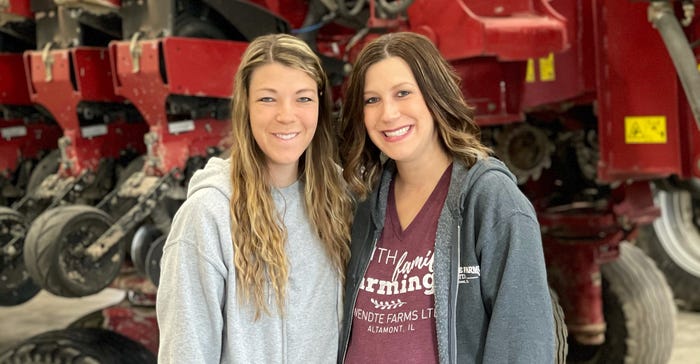
Sisters Lydia Holste and Faith Kemme, and sisters Beth and Amy Marcoot are carving out their own careers on their family farms, but in very different ways.
Holste and Kemme are using their skills to add value to the family’s grain operation, Wendte Farms Ltd. The Marcoot sisters helped their parents build a value-added operation around the family’s historic Jersey dairy farm, making cheese and hosting tours on the farm.
Related: Female and farming
The four women are part of a growing number of young women choosing production agriculture as a career. It’s tough to capture the change in women farmers nationally and within Illinois, but USDA says the number of female producers increased by 27% from 2012 to 2017, to 1.2 million female farmers working 388 million acres and racking up $148 billion in sales.
Related: Women: Picture a future on the farm
Granted, USDA revised its census questions in 2017 to better capture that demographic, which likely resulted in higher numbers. Still, anecdotally, farmers, agribusinesses and Illinois FBFM report a moderate but significant shift in women doing the work and making the decisions on Illinois farms.
Flexible farmer embraces seasons
Lydia Holste may only be 31, but she has already experienced three seasons of life as a farmer. Maybe more.
As a young person, the Altamont, Ill., farmer was working ground by age 10, feeding livestock and baling hay. By the time she was in college, she was putting on anhydrous, helping with the family seed dealership, and learning payroll and accounting.
But before Holste and her younger sister, Faith Kemme, went off to the University of Illinois, their dad told them they had to work off the farm three years before coming back — and bring a skill with them.
So Holste went to work for Case New Holland doing technical support for precision agricultural and construction equipment. You guessed it: She was on-call remote tech support for her dad before she ever came home.
True to her word, she came back to the farm after three years, bringing along her husband, Adam Holste. Kemme did the same, securing a master’s in agribusiness and agronomy and bringing her husband, Matt Kemme, back to the farm. Now all four of them work with the sisters’ parents at Wendte Farms Ltd.
Starting in 2014, the Holstes rented and bought ground using a Farm Service Agency loan for beginning farmers. The Kemmes have done the same.
Today, the Holstes have three children and one on the way, so Lydia’s days are less full-time tractor driving and more seed invoicing and accounting, communications, and parts runs — jobs she can work around her duties raising the next generation on the farm.
“Farming is my job. It’s full time. But it’s not like I go to the farm from 7 a.m. to 4 p.m. My mom reminds me of that: ‘Yes, you stay at home, but you work on the farm,’” she says.
You can bet Lydia’s still on tech support. This spring she heard the crew on the radio trying to solve a problem with the GPS receiver. She called Adam and told him what to try. It worked!
“Some days they talk about problems and I don’t have a clue,” she says. “But occasionally I can save us the expense of a service call.”
Sisters make dad’s creamery dreams come true
Beth Marcoot remembers going to the front door with her dad when she was maybe 10 years old. They’d just read a magazine story about Hilmar Cheese Co. in California, formed by a dozen Jersey farmers.
“Wouldn’t it be cool if we could make cheese with our own cows’ milk?” he asked her, looking out over their Greenville, Ill., farm and cows.
At the time, young Beth didn’t entirely understand: “Yeah, sure, Dad. Whatever.” But the vision was cast.
Fast-forward to today, and Beth jokes they’re a family of accidental cheesemakers. When she and sister Amy left for the University of Illinois in the early 2000s, neither intended to come home. They graduated and went off to other jobs. But in 2008, their parents were ready to do something different, launching conversations about value-added enterprises. She and Amy got excited about that, and before long, Marcoot Jersey Creamery was born.
Beth says it’s been a good fit because first of all, cheese is delicious. And second, fresh, intermediate and aged cheeses work well to stagger inventory and manage cash flow. Plus, they’re close to the St. Louis market.
Today, the seventh-generation Jersey cow farmers are producing 150,000 pounds of cheeses a year from the milk of 100 Jersey cows, all milked by robots (Dad John’s idea). They put in viewing windows and, pre-COVID-19, brought 20,000 people a year to the farm for tours.
Beth and her dad manage the cow herd and milking. Amy manages the creamery and sales, and their mom, Linda, is a retired registered dietitian with an invaluable background in food sanitation. Their neighbor and childhood friend Audie Wall is head cheesemaker and business partner, and Audie’s sister-in-law Laura Wall is tour director. Beth also handles marketing and social media.
Sure, they’re successful, but they’re also happy. “I really enjoy working with my parents,” Beth says, sharing how everyone steps in to help wherever they can.
“It’s the perfect description of a farm family, where we’re farming and living together. I feel honored that we can do this together.”
About the Author(s)
You May Also Like






